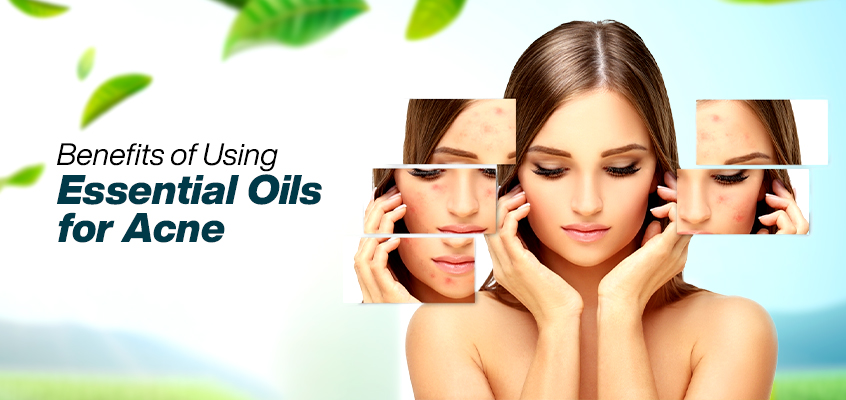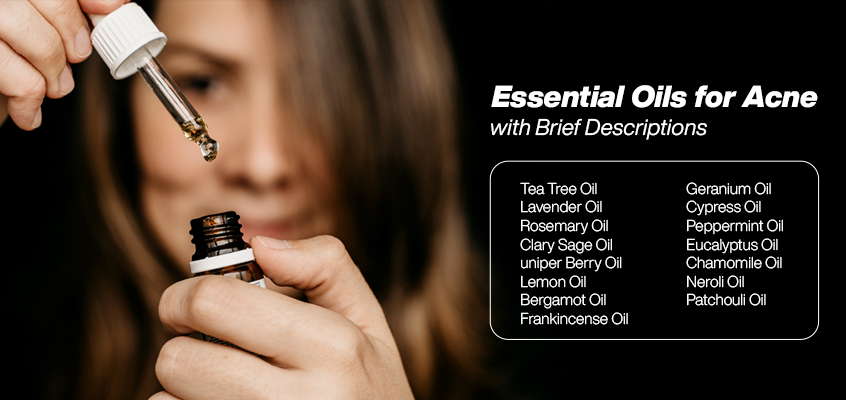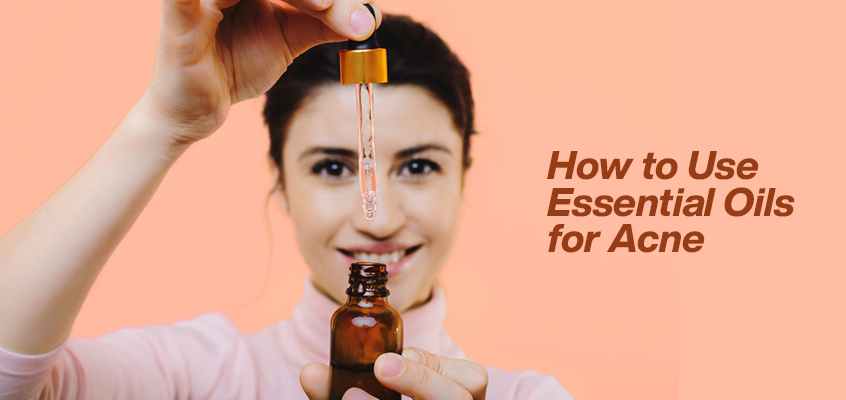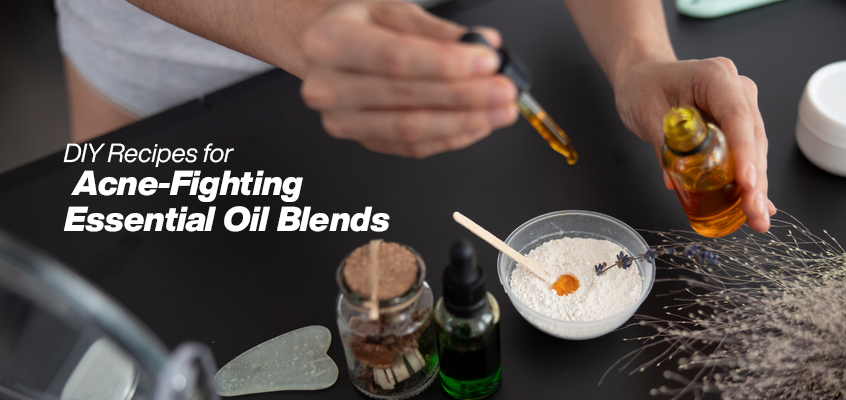Essential Oils for Acne

The Ultimate Guide to Essential Oils for Acne: Effective Remedies and Precautions
Acne is more than just a skin condition—it's a source of stress, discomfort, and sometimes lasting scars. While conventional treatments like salicylic acid and benzoyl peroxide can help, they often come with side effects like dryness and irritation. For those looking for gentler, plant-based alternatives, essential oils may offer real benefits.
In this guide, we’ll explore how essential oils can help treat acne, which oils are most effective (and why), how to use them safely, and what science says about their effectiveness.
- Introduction
- Brief overview of acne and its impact on skin health.
- What Causes Acne?
- Explanation of the factors contributing to acne formation.
- Treatment and Prevention
- Overview of conventional treatments and lifestyle changes for acne prevention.
- Understanding Essential Oils
- Introduction to essential oils and their role in skincare.
- How to Use Essential Oils for Acne
- Proper application methods and dilution guidelines.
- 15 Essential Oils for Acne with Brief Descriptions
- Detailed breakdown of each essential oil's benefits and usage.
- Oils to Avoid If You Have Acne
- List of oils that may exacerbate acne symptoms.
- Side Effects and Risks
- Potential adverse effects of using essential oils for acne treatment.
- Safety Precautions
- Essential safety tips for using essential oils effectively.
- Alternative Treatments for Acne
- Explore additional natural remedies and complementary therapies.
- Tips for Prevention
- Lifestyle tips and skincare routines to prevent acne breakouts.
- FAQs: Essential Oils for Acne
- Answers to common questions regarding the use of essential oils for acne treatment.
Acne, a common skin condition, affects millions worldwide, impacting not only physical appearance but also self-esteem. Understanding its causes and effective treatment options is crucial for achieving clear, healthy skin.
What Causes Acne?
Acne arises from various factors, including hormonal imbalances, excess sebum production, bacteria, and inflammation. Genetics, diet, stress, and environmental factors also play significant roles in acne development. Here's a detailed explanation of the key factors contributing to acne formation:
- Hormonal Imbalances: Fluctuations in hormone levels, especially during puberty or menstruation, can stimulate excess oil production.
- Excessive Sebum Production: Overproduction of sebum by the sebaceous glands can clog pores and lead to acne.
- Bacterial Infection: Propionibacterium acnes bacteria thrive in clogged pores, causing inflammation and acne lesions.
- Inflammation: Immune response to bacteria and clogged pores results in redness, swelling, and acne formation.
- Genetics: Predisposition to acne can be inherited, with certain genetic factors influencing sebum production and pore size.
- Diet: High-glycemic foods and dairy products may exacerbate acne by triggering hormonal fluctuations and inflammation.
- Environmental Factors: Pollution, humidity, and certain skincare products can contribute to acne by clogging pores and irritating the skin.
Understanding the multifactorial nature of acne formation is essential for implementing targeted treatment strategies and preventive measures.
The Truth and Myth of Acne
Acne has long been surrounded by myths and misconceptions. Let's debunk some of the most common ones:
- Myth 1: Popping pimples helps them go away faster. Contrary to what you may think, popping pimples can actually worsen the inflammation and lead to scarring. It's best to resist the temptation and let them heal naturally.
- Myth 2: Acne only affects teenagers. While acne is most prevalent during puberty, it can affect people of all ages. Adult-onset acne is a real thing, and many adults struggle with it.
- Myth 3: Sun exposure clears acne. While it may seem like your acne improves after spending time in the sun, this is only temporary. Sun exposure can actually worsen acne in the long run and increase the risk of skin damage and premature aging.
Treatment and Prevention:
Conventional treatments for acne range from topical creams to oral medications, targeting different aspects of the condition. Additionally, lifestyle modifications such as proper skincare routines, balanced diet, and stress management can aid in preventing acne.
- Conventional treatments encompass topical creams, gels, and oral medications prescribed by dermatologists to target acne symptoms.
- Lifestyle changes play a crucial role in preventing acne, including adopting a consistent skincare routine with gentle cleansers and non-comedogenic moisturizers.
- Regular exfoliation helps unclog pores and remove dead skin cells, reducing the risk of acne breakouts.
- Managing stress through relaxation techniques like yoga or meditation can improve hormonal balance and reduce acne flare-ups.
- Avoiding excessive sun exposure and using non-comedogenic sunscreen protects the skin and prevents worsening of acne.
Understanding Essential Oils: Essential oils are concentrated plant extracts renowned for their therapeutic properties. When used correctly, they can address various skin concerns, including acne, thanks to their antibacterial, anti-inflammatory, and healing properties.
Benefits of Using Essential Oils for Acne
- Anti-inflammatory properties: One of the primary benefits of essential oils for acne is their ability to reduce inflammation. Many essential oils, such as tea tree oil and lavender oil, contain compounds that inhibit the production of inflammatory molecules in the skin. By reducing inflammation, essential oils can help calm redness and swelling associated with acne.
- Antimicrobial effects: Acne is often caused by the overgrowth of bacteria on the skin. Essential oils, such as tea tree oil and oregano oil, have powerful antimicrobial properties that can combat acne-causing bacteria. These oils can help kill the bacteria present in the hair follicles, preventing further infection and breakouts.
- Antioxidant benefits: Essential oils are rich in antioxidants that help protect the skin from damage caused by free radicals. Free radicals are unstable molecules that can damage cells and contribute to inflammation. By neutralizing free radicals, essential oils can promote skin healing and reduce the risk of acne scarring.
- Gentle and natural: Unlike harsh chemical treatments, essential oils are gentle on the skin and do not strip away the skin's natural oils. This makes them suitable for all skin types, including sensitive skin. Essential oils also provide a natural alternative to conventional acne treatments, which often contain synthetic ingredients that can irritate the skin.
Now that we understand the benefits of using essential oils for acne, let's explore some of the top essential oils that are effective in treating this common skin condition.
15 Essential Oils for Acne with Brief Descriptions:
Essential oils have gained immense popularity in holistic skincare, particularly for managing breakouts. Whether you're dealing with hormonal acne or occasional flare-ups, the right plant-based oils can help balance sebum production, soothe inflammation, and fight bacteria—all without harsh side effects.
Here are 15 of the most effective Essential Oils for Acne, each with a brief yet powerful description of how it can support healthier skin:
- Tea Tree Oil: Known for its potent antimicrobial properties, tea tree oil effectively targets acne-causing bacteria and reduces inflammation.
- Lavender Oil: With its soothing and calming effects, lavender oil helps alleviate redness and irritation associated with acne.
- Rosemary Oil: Rich in antioxidants, rosemary oil assists in unclogging pores and controlling excess oil production.
- Clary Sage Oil: Balancing sebum levels and reducing inflammation, clary sage oil is beneficial for oily and acne-prone skin.
- Juniper Berry Oil: With its astringent properties, juniper berry oil helps tighten pores and reduce the appearance of acne scars.
- Lemon Oil: High in vitamin C and citric acid, lemon oil aids in exfoliating dead skin cells and brightening skin tone.
- Bergamot Oil: Known for its antibacterial and antiseptic properties, bergamot oil helps combat acne-causing bacteria and reduce excess oil.
- Frankincense Oil: With its anti-inflammatory and healing properties, frankincense oil promotes skin regeneration and reduces acne scarring.
- Geranium Oil: Balancing oil production and promoting skin cell regeneration, geranium oil is beneficial for acne-prone skin.
- Cypress Oil: With its astringent properties, cypress oil helps tighten pores and reduce excess oil secretion.
- Peppermint Oil: Refreshing and invigorating, peppermint oil provides a cooling sensation while reducing inflammation and redness.
- Eucalyptus Oil: Known for its antimicrobial properties, eucalyptus oil effectively combats acne-causing bacteria and reduces inflammation.
- Chamomile Oil: Soothing and calming, chamomile oil helps reduce redness and inflammation associated with acne.
- Neroli Oil: With its rejuvenating properties, neroli oil promotes skin cell renewal and reduces the appearance of acne scars.
- Patchouli Oil: Regulating oil production and promoting skin regeneration, patchouli oil aids in preventing and treating acne breakouts.
These 15 Essential Oils for Acne offer a range of therapeutic benefits—from balancing oil and fighting bacteria to calming inflammation and reducing scars. While results may vary based on skin type, incorporating these oils into a thoughtful skincare routine can offer a gentler and more natural path to clearer skin.
Always consult a dermatologist or aromatherapist before starting new skincare treatments, especially if you have sensitive or reactive skin.
How to Use Essential Oils for Acne:
Proper application methods and dilution guidelines are essential when using essential oils for acne treatment. Options include direct application, dilution with carrier oils, or incorporation into skincare products like cleansers and masks.
- Dilute essential oils: Mix 1-2 drops of essential oil with a carrier oil like jojoba or coconut oil to avoid skin irritation.
- Spot treatment: Apply diluted essential oil directly to acne spots using a cotton swab or clean fingertips.
- Facial steam: Add a few drops of essential oil to hot water, cover your head with a towel, and steam your face for 5-10 minutes to open pores and allow better absorption.
- Mix with skincare products: Add a drop of essential oil to your daily moisturizer, cleanser, or face mask for added acne-fighting benefits.
- Perform a patch test: Apply a small amount of diluted essential oil to a small area of skin to check for any adverse reactions before full application.
- Limit exposure to sunlight: Some essential oils can increase photosensitivity, so avoid sun exposure after applying them to your skin.
Oils to Avoid If You Have Acne:
While many essential oils offer benefits for acne-prone skin, some may exacerbate symptoms or cause adverse reactions. Oils with high comedogenic ratings, such as coconut oil and cocoa butter, should be avoided by individuals prone to acne.
- Comedogenic Oils: Avoid oils with high comedogenic ratings, such as coconut oil and cocoa butter, as they can clog pores and exacerbate acne.
- Heavy Oils: Steer clear of heavy oils like mineral oil and wheat germ oil, which may contribute to pore congestion and acne flare-ups.
- Fragrant Oils: Fragrant oils like citrus oils and certain floral extracts can irritate sensitive skin and trigger breakouts, making them unsuitable for acne-prone individuals.
- Synthetic Oils: Synthetic oils or those containing artificial additives and preservatives may aggravate acne symptoms and disrupt skin's natural balance. Opt for natural, pure oils whenever possible.
- Highly Saturated Oils: Oils high in saturated fats, such as palm oil and coconut oil derivatives, can increase oiliness and block pores, leading to acne formation. Choose lighter, non-comedogenic oils for acne-prone skin.
Precautions and Safety Tips When Using Essential Oils for Acne
While essential oils can be highly beneficial for acne treatment, it's important to use them with caution. Here are some precautions and safety tips to keep in mind:
- Skin sensitivity: Essential oils are highly concentrated and can cause skin irritation or sensitization if used undiluted or in excessive amounts. Always dilute essential oils with a carrier oil before applying to the skin, and perform a patch test to check for any adverse reactions.
- Sun sensitivity: Some essential oils, such as citrus oils like bergamot or lemon, can increase the skin's sensitivity to sunlight. Avoid direct sun exposure or use sun protection measures, such as wearing sunscreen and protective clothing, when using these oils on your skin.
- Pregnancy and breastfeeding: Certain essential oils, such as clary sage or rosemary, are not recommended for use during pregnancy or breastfeeding. Consult with a healthcare professional before using essential oils if you are pregnant or breastfeeding.
- Allergies: If you have known allergies to specific plants or botanicals, avoid using essential oils derived from those sources. Always read the labels and check for any potential allergens before using an essential oil.
By following these precautions and safety tips, you can enjoy the benefits of essential oils for acne treatment without any unwanted side effects. Now, let's move on to exploring some DIY recipes for acne-fighting essential oil blends.
DIY Recipes for Acne-Fighting Essential Oil Blends
Creating your own acne-fighting essential oil blends is a fun and cost-effective way to incorporate these powerful oils into your skincare routine. Here are a few simple recipes to get you started:
- Tea Tree Spot Treatment: In a small roller bottle, combine 2 drops of tea tree oil, 2 drops of lavender oil, and 1 tablespoon of jojoba oil. Apply this blend directly to acne spots using a clean fingertip or a cotton swab.
- Lavender Facial Mist: In a spray bottle, combine 10 drops of lavender oil, 1 teaspoon of witch hazel, and 2 ounces of distilled water. Shake well before each use and spritz onto clean skin as a refreshing and acne-fighting facial mist.
- Frankincense Face Serum: In a dark glass dropper bottle, combine 5 drops of frankincense oil, 5 drops of rosehip oil, and 1 ounce of argan oil. Apply a few drops of this serum to your face and neck after cleansing for nourished and acne-free skin.
Feel free to experiment with different essential oils and carrier oils to find the perfect blend for your skin. Remember to always dilute essential oils and perform a patch test before applying to your face.
Other Natural Remedies for Acne
While essential oils can be highly effective in treating acne, it's worth exploring other natural remedies that can complement their benefits. Here are a few additional strategies to consider:
- Diet: A healthy diet can play a significant role in managing acne. Reduce your intake of processed foods, sugary snacks, and dairy products, as they can contribute to inflammation and acne breakouts. Instead, focus on consuming a balanced diet rich in fruits, vegetables, lean proteins, and whole grains.
- Proper skincare: In addition to using essential oils, establish a consistent skincare routine that includes gentle cleansing, exfoliating, and moisturizing. Avoid harsh scrubs or cleansers that can strip away the skin's natural oils and irritate acne-prone skin.
- Stress management: Stress can exacerbate acne. Incorporate stress-reducing activities into your daily routine, such as yoga, meditation, or deep breathing exercises. Getting enough sleep and practicing good sleep hygiene can also help manage stress levels.
- Avoid picking or popping: It can be tempting to pick or pop acne, but this can lead to further inflammation, scarring, and infection. Instead, let acne heal naturally or seek professional help if needed.
By combining these natural remedies with the power of essential oils, you can achieve clear and healthy skin.
Buying Guide
When it comes to choosing the best essential oil for acne, there are a few factors to consider. Here are some features to look for when making your decision:
- Purity : Make sure the essential oil you choose is pure and free of any additives or synthetic ingredients. Look for oils that are labeled as 100% pure and have been extracted using a steam distillation or cold-pressing method.
- Quality : The quality of the essential oil is also important. Look for oils that are sourced from reputable companies and have been tested for quality and purity. You can also look for oils that are certified organic or have other certifications that indicate their quality.
- Skin Type : Consider your skin type when choosing an essential oil. Some oils may be more suitable for oily or acne-prone skin, while others may be better for dry or sensitive skin. Look for oils that are known to be beneficial for your specific skin type.
- Application Method : There are several ways to apply essential oils for acne, including topical application, inhalation, and ingestion. Consider which method is most convenient and effective for you.
- Price : Finally, consider the price of the essential oil. While high-quality oils may be more expensive, they are often more effective and worth the investment. However, be wary of oils that are priced too low, as they may not be pure or of good quality.
Overall, choosing the best essential oil for acne requires careful consideration of several factors. By taking the time to research and compare different options, you can find an oil that is effective and safe for your skin.
🌿 Why Choose Natural Remedies Like Essential Oils?
Natural treatments don’t guarantee overnight miracles, but they’re a safer, gentler approach for long-term skin health. With the right choice and application, essential oils can:
- Help minimize breakouts
- Calm existing inflammation
- Prevent future flare-ups without irritating the skin
They’re not a replacement for professional skincare, but they can be a highly effective supplement.
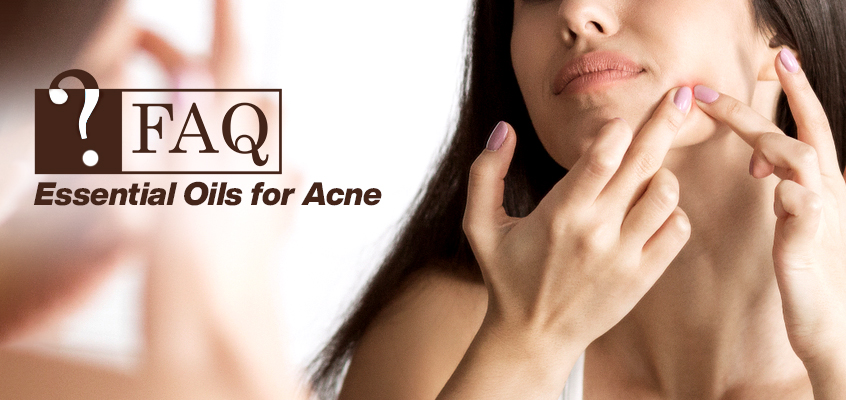
FAQs: Essential Oils for Acne:
Certainly, here are some frequently asked questions (FAQs) about essential oils for acne:
- Can essential oils alone cure acne? While essential oils can be effective in managing acne, they may not provide a complete cure on their own. It's essential to adopt a comprehensive approach to skincare, including proper cleansing, diet, and lifestyle adjustments.
- Are there any essential oils suitable for sensitive skin? Yes, some essential oils are gentler on sensitive skin than others. Lavender and chamomile oils are known for their soothing properties and are generally well-tolerated by sensitive skin types.
- How often should I apply essential oils for acne? The frequency of application depends on various factors, including the type of essential oil, skin sensitivity, and individual response. As a general guideline, start with a small amount and gradually increase frequency if no adverse reactions occur. However, it's essential not to overuse essential oils, as they can cause skin irritation.
- Can essential oils cause skin irritation? Yes, essential oils have the potential to cause skin irritation, especially when used undiluted or in high concentrations. Performing a patch test before using essential oils on larger areas of the skin can help determine sensitivity and reduce the risk of irritation.
- Is it safe to use essential oils during pregnancy? Certain essential oils are considered safe for use during pregnancy, while others should be avoided or used with caution. Pregnant individuals should consult healthcare professionals before using essential oils to ensure safety for both themselves and the baby.
- How long does it take for essential oils to show results in acne treatment? The timeframe for seeing results may vary depending on individual factors such as skin type, severity of acne, and consistency of use. Some individuals may notice improvements within a few days to weeks, while others may require more extended periods for noticeable changes.
- Can essential oils be used alongside other acne treatments? Yes, essential oils can complement conventional acne treatments such as topical creams or oral medications. However, it's essential to consult with a dermatologist or healthcare provider before combining different treatments to avoid potential interactions or adverse effects.
- Are there any essential oils that should be avoided for acne-prone skin? Certain essential oils have high comedogenic ratings and may exacerbate acne symptoms. Examples include coconut oil, cocoa butter, and wheat germ oil. It's crucial to research and select oils with low comedogenic ratings for acne-prone skin.
- Can essential oils help reduce acne scars? Some essential oils, such as rosehip oil and helichrysum oil, are believed to have skin-regenerating properties that may help reduce the appearance of acne scars over time. However, consistent and long-term use may be necessary to see significant improvements.
- How should essential oils be stored to maintain their potency? Essential oils should be stored in a cool, dark place away from direct sunlight and heat to preserve their potency and efficacy. Additionally, tightly sealing the bottles and avoiding exposure to air can help prolong the shelf life of essential oils.
- How to know what type of acne you have? To identify the type of acne you have, observe the characteristics of the blemishes on your skin: - Whiteheads: These are small bumps that appear white at the surface. - Blackheads: Look for tiny, dark-colored specks on the skin, which are not raised. - Papules: These appear as small, red, inflamed bumps that are tender to the touch. - Pustules: Similar to papules, but these bumps contain yellowish pus. - Nodules: These are large, hard, painful lumps embedded deeply in the skin. - Cysts: These are large, pus-filled lesions that are soft and lie deep within the skin, often causing scarring.
- How to use rosemary oil for acne? To treat acne with rosemary oil, start by mixing a small amount of the essential oil with a carrier oil such as coconut or jojoba oil to prevent skin irritation. Using a clean cotton swab, gently dab the diluted oil onto the areas of your skin affected by acne.
- Is jojoba oil good for acne scars? Studies indicate that jojoba oil contains properties that facilitate the binding of skin cells, which can be beneficial in treating both acne and the scars it leaves behind. Thus, jojoba oil is considered effective for reducing the appearance of acne scars.
- Is oregano oil good for acne? Studies indicate that oregano oil, particularly in its nanoemulsion form, is effective in treating acne and may even surpass the efficacy of some traditional cosmetic products. This suggests that oregano oil could be a beneficial natural remedy for acne management.
- How do you use tea tree oil for acne? To apply tea tree oil for treating acne, start by diluting it to ensure it's gentle on your skin. Mix two drops of tea tree oil with one tablespoon of a carrier oil, such as coconut or olive oil, which you likely have in your kitchen. After properly mixing the oils, use clean fingertips or a cotton ball to gently apply the blend to the affected areas of your skin.
- What essential oils get rid of pimples fast? To effectively treat pimples quickly, several essential oils are highly recommended due to their antimicrobial and anti-inflammatory properties. Notable among these are tea tree oil, known for its potent antibacterial qualities, and lavender oil, which soothes the skin while reducing inflammation. Lemon oil can also be beneficial due to its cleansing effects. Additionally, oils like petitgrain and thyme offer strong antibacterial benefits. Frankincense oil is celebrated for its ability to heal and renew skin, while rosemary oil's anti-inflammatory properties help calm irritated skin. Bergamot oil, which should be used with caution as it can be photosensitive, also assists in reducing acne.
- What are some less common essential oils like Sandalwood, Clary Sage, and Neroli that can be beneficial for acne treatment? Some lesser-known essential oils that may be effective for treating acne include Sandalwood, Clary Sage, and Neroli. Sandalwood oil, often used in Ayurvedic practices, has soothing properties that help reduce the discomfort caused by acne while addressing some causative factors of skin outbreaks. It imparts a sweet and woody aroma. Clary Sage oil is another beneficial essential oil, particularly for those with oily skin. Its components, including linalyl acetate and geranyl, help regulate the production of sebum, potentially reducing acne occurrences. This oil has a floral and herbaceous scent and is typically applied in combination with a carrier oil to balance skin hydration. Neroli oil, though less commonly incorporated into skincare routines, offers valuable benefits for skin health, primarily through its ability to help balance sebum levels. The presence of citral in the oil enhances its skincare properties. Neroli has a complex scent profile that is citrusy, floral, and slightly bitter. These oils should be used cautiously and in diluted form, mixed with carrier oils to prevent any skin irritation and to achieve the best results in managing acne.
- How do different essential oils like Bergamot, Geranium, and Oregano work to combat acne? Different essential oils, including Bergamot, Geranium, and Oregano, offer unique benefits for acne-prone skin. Bergamot oil, known for its uplifting citrus scent, also has properties that help reduce oiliness and purify the skin, thus helping to clear acne. Geranium oil, sourced from the Egyptian Geranium plant, is valued for its ability to minimize skin breakouts and irritations while promoting a healthy, rejuvenated complexion. Oregano oil is particularly potent in addressing acne; it can be applied directly to pimples as a spot treatment, effectively reducing blemishes and aiding in the prevention of future outbreaks. Together, these oils provide a natural solution for managing acne and improving skin health.
- How can carrier oils be used with essential oils for acne treatment? Carrier oils play a vital role in the safe and effective use of essential oils, especially for treating acne-prone skin. These base oils, such as Jojoba Oil or Rosehip Oil, help in diluting the potent essential oils, ensuring they do not clog pores or cause irritation. For acne treatment, it is advisable to mix three drops of the essential oil with one tablespoon of a carrier oil. This method not only minimizes skin sensitivity but also maintains the therapeutic properties of the essential oils, making the blend beneficial for managing acne and healing scars.
-
What are essential oils for acne and their benefits? To address the question of which essential oils are beneficial for acne and their specific advantages, it's important to highlight a range of essential oils each known for their unique properties in treating acne-prone skin:
- Helichrysum Oil - Extracted from a small perennial, this oil is renowned for its skin rejuvenating effects. It helps in diminishing acne scars, promoting a radiant complexion.
- German Chamomile Oil - Ideal for soothing sensitive and acne-affected skin, this oil is gentle and helps in calming skin inflammations.
- Manuka Oil - Known for its antibacterial properties, Manuka oil effectively soothes inflamed skin and reduces acne occurrences by fighting off acne-causing bacteria.
- Tea Tree Oil - A well-known anti-acne essential oil, tea tree helps in deeply cleansing pores and reducing oil buildup, making it a staple in acne skin care.
- Bergamot Oil - This oil is particularly good for oily skin, helping to keep the skin clean and clear of bacteria and reducing acne flare-ups.
- Lavender Oil - With its soothing properties, lavender oil not only helps in moisturizing the skin but also in reducing redness and acne marks.
- Geranium Oil - This floral oil helps maintain a balanced skin condition, reducing acne breakouts and enhancing the skin’s appearance to a more vibrant tone.
- May Chang Oil - Known for its refreshing aroma, it also assists in clearing up acne from oily skin by purifying the skin pores.
- Juniper Berry Oil - Its natural antiseptic properties help in treating acne and soothing skin irritations, making it effective for sensitive skin types.
- Clove Bud Oil - With powerful antimicrobial properties, clove oil is effective in reducing acne size and redness. Thyme Oil - Thyme is beneficial for its bactericidal properties, helping to cleanse the skin and prevent future acne outbreaks.
- Rosemary Oil - It not only helps reduce acne but also diminishes puffiness, improving overall skin health and clarity.
- Oregano Oil - This robust oil is renowned for its ability to combat bacterial infections, thus preventing and reducing acne lesions.
- Peppermint Oil - Besides controlling oil secretion, peppermint oil offers a cooling effect which soothes itchiness and irritation often associated with dry or reddened skin. Each of these essential oils offers distinct benefits suitable for managing various aspects of acne-prone skin, from cleansing and soothing to healing and rejuvenating. Incorporating these into a skincare routine can lead to clearer and healthier skin.
Conclusion: Essential oils offer promising natural remedies for acne treatment, but proper usage and precautions are paramount. By understanding their benefits, risks, and application methods, individuals can effectively incorporate essential oils into their skincare routines for clearer, healthier skin.
This comprehensive guide equips readers with the knowledge needed to navigate the world of essential oils for acne with confidence and safety.
You May Also Like:

